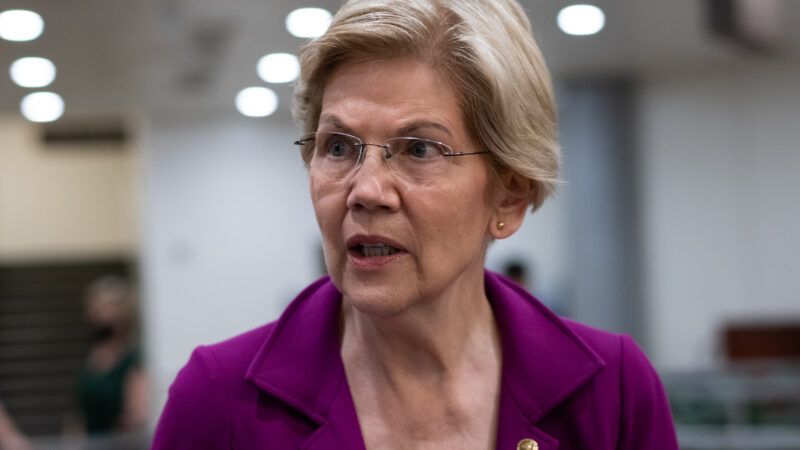Elizabeth Warren's Plan To Close the 'Tax Gap' Doesn't Add Up
But it would triple the IRS budget and give the tax cops a lot more power to make life miserable for individuals and businesses.

Sen. Elizabeth Warren (D–Mass.) says her plan to more than double the annual IRS budget would allow the federal government to collect an extra $1.75 trillion over the next 10 years.
But that windfall of new revenue—generated by beefing up IRS enforcement and giving the federal tax cops more authority to snoop through Americans' financial records and even bank statements looking for targets to audit—seems unlikely. Despite lawmakers' eagerness to scoop up more revenue without having to increase tax rates, the estimates offered in Warren's plan are far out of line with official projections about the size of the so-called "tax gap" and the amount of revenue that can be captured with additional enforcement.
When you get right down to it, her plan seems based on little more than a hunch and some bad math.
Warren's "Restoring the IRS Act of 2021" would hike the agency's budget from $11.9 billion to $31.5 billion. It would also remove the IRS from the annual appropriations scramble in Congress—shifting it from the federal budget's discretionary side that lawmakers can adjust every year to the mandatory portion of the budget, alongside Social Security and other programs that run on autopilot.
"For too long, the wealthiest Americans and big corporations have been able to use lawyers, accountants, and lobbyists to avoid paying their fair share—and budget cuts have hollowed out the IRS so it doesn't have the resources to go after wealthy tax cheats," Warren said in a press release. In practice, that means giving the IRS a big budgetary boost and giving the agency the authority to dig through bank accounts and transaction records from third-party services such as Venmo, something Warren says will allow the IRS to target "taxpayers with less visible income streams."
All this, she claims, could net the federal Treasury as much as $1.75 trillion over 10 years. That would be a staggering amount of new revenue—an amount that is wildly out of line with other estimates.
The most recent official IRS estimate says the size of the "tax gap"—the difference between how much tax is owed and how much is actually collected—is about $381 billion. That calculation relied on tax data from nearly a decade ago, and some sources suggest the figure is significantly higher today. Treasury Secretary Janet Yellen, for example, recently estimated that the gap is about $700 billion—and that's the figure that Biden has used as well. But even if the tax gap has expanded to twice the IRS estimate, it would still be nearly a full $1 trillion short of Warren's claims.
So where is Warren getting this number? In part, it seems, from an offhand remark during a Senate hearing earlier this year.
Asked by Sen. Ron Wyden (D–Ore.) during a hearing in April to offer a "personal opinion" on the size of the tax gap, IRS Commissioner Charles Rettig said it is "not outlandish to believe that the actual tax gap could approach and possibly even exceed $1 trillion per year."
That claim was widely reported in the press—but in the context of a hearing where Rettig was trying to persuade lawmakers to boost his own budget, it seems clear that the figure was not the result of rigorous study.
That's the hunch. The bad math has to do with a recent Treasury Department study that found tax revenue would increase by $6 for every dollar invested in enforcement at the IRS. Even if that's true, Warren's plan to hike IRS funding by $196 billion over 10 years would have to net near $9 per new dollar—and that assumes that every one of those new dollars is spent entirely on enhanced enforcement, which is simply unrealistic.
Warren's proposal also ignores diminishing returns. The Congressional Budget Office estimates that increasing IRS funding by $20 billion over 10 years would net $61 billion in new revenue, while hiking enforcement spending by $40 billion would net only $103 billion.
"It's likely that the revenue to be gained from increased enforcement funding would fall off rather quickly," argues Andrew Wilford, a senior analyst for the National Taxpayers Union Foundation.
Nor would the crackdown affect only high earners and corporations. Unpaid or underpaid corporate income taxes account for only about 10 percent of the tax gap, according to the IRS. The majority of the "tax gap" comes from individual income taxes, and a good portion of that part of the tax gap is tied up in misallocated tax credits. Warren is pitching her proposal by claiming that she's cracking down on wealthy tax cheats, but accomplishing her goals would require audits on families earning less than $50,000 a year too.
Despite all these shortcomings, Warren's proposal is likely to get serious consideration in the Democratic-controlled Congress and from the White House. President Joe Biden has already signaled his support for beefing up IRS enforcement as a way to raise as much as $700 billion to pay for parts of his expensive agenda. He plans to use that new revenue to cover nearly half the cost of his $1.8 billion "American Families Plan."


Show Comments (214)